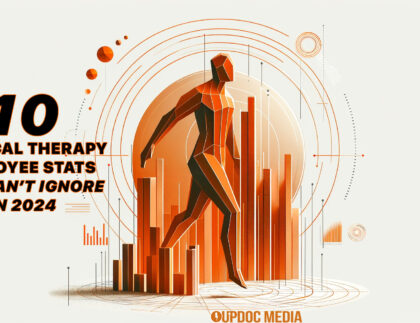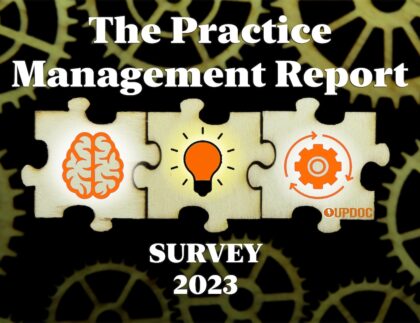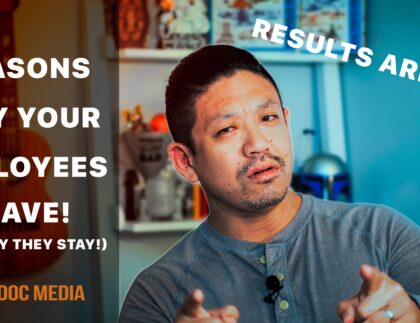
Author: Ben Fung, Chief Operating Officer
We are in this interesting time in healthcare where things are truly getting shaken up. For every practice out there that is struggling is another that is flourishing. For every area that has a terrible marketplace price point for reimbursement comes another that seems “more like it” and far more favorable to the business owner or practice manager. AND, in this time when value based healthcare is on its way with some serious dollar based repercussions and incentives… disruption is EVERYWHERE and change is all over the place. Fortunately, there are constants despite disruptions that will NOT go away because healthcare is a people business.
3 Things In Healthcare That Are NOT GOING AWAY!
1. Disruption via Technology
Disruption occurs when attributes are more conveniently combined or a capability is made more accessible. We’ve seen this from transistor technology disrupting vacuum tubes… all the way full circle to tubes coming back. Streaming technology killed off brick-and-mortar content (RIP Blockbuster). Even Steve Jobs’ famous words, “An iPod, a Phone, and an Internet Communicator… These are not three separate devices. This is one device!”
Those who refuse to ride the waves, prepare for them, and perhaps even become part of it — will be washed over, held down… many times, down for the count. A simple example of our time: Robotic Surgery. Surgeons feeling replaced by the technological disruption refused to adopt and change, and eventually retired. Surgeons feeling empowered by disruption innovation, integrated robotics into their practice and thrived.
We are still in this “storm” of healthcare disruption. And, as most surfers will tell you:
The best waves for surfing come when storms are over the horizon.
That is, unless you’re this guy — which, if you’ve ever wondered whatever happened to him… well, here you go!
- The obligatory office visit, disrupted by asynchronous patient-provider communications. I mean, seriously… when was the last time you were basically 100% about something health related you knew and you knew your provider already knew was the same problem. BUT, the triage reception team and nurse followed protocol, causing you to make an appointment, drive to the medical office, wait 15 minutes in reception, 10 minutes in the waiting room, all for a 3 minute conversation and “check up” that went exactly the way you knew it would… only to get the prescriptive outcome you knew you’d get / would need. Yeah…… AND, that leads us to…!
- Artificial intelligence, augmenting and potentially replacing front desk and call centers are front line customer reception. Too far fetched? Well, you might want to take a gander at this video: Google Duplex: A.I. Assistant Calls Local Businesses To Make Appointments. PS. Don’t miss the absolute LOL moment at 1:24 in that video.
- 3D printing for tissue repair — wound care Physical Therapists, hope you’ve been keeping tabs!
- Even more, noninvasive diagnostics that are very likely going to be mobile powered, synchronized, or even analyzed. For the world of physical and rehab therapy, this could very well be done through dual camera technology already available in our smartphones with and/or without the help of wearables.
- And, redirection of clinical pathways due to maturation of population health data sets. Which leads us to…!
2. Data Science Determining Value
Value based healthcare has been in the talks — forever. for-ever. for…ever!
It’s a shoutout all the way back to the classical story of evidenced based practice and blood letting back in the France circa mid-early 1800s [see 1, 2, and 3] — the fact of the matter is this: People are getting wise.
There’s an entire shift from volume based care to value based care. AND, there are now numerical systems that can track upstream and downstream cost savings, value addition, and clinical efficacy. During the 2018 Graham Sessions, it was noted that a spine surgery prevented by a Physical Therapist in the Emergency Department essentially saves $80,000. It was noted at Ascend that seeing a Physical Therapist as the first provider across the clinical care pathway would decrease a patient’s opioid exposure risk by 75%-90% for those categorized with low back pain. THESE are the types of data driven value statements that will drive the future of healthcare.
So… QUESTION: Is your practice tracking meaningful metrics in a systematic way?
3. Marketing Will Matter More Than Ever
Marketing isn’t just “marketing” anymore. It’s not just about more patients or even new patients. Marketing has gotten to a new level where creating demand needs to happen for stakeholders, for talent acquisition, and for the sake of the regional and greater economy as a whole.
The thing is, marketing has ALWAYS mattered. In the modern age, healthcare professionals have operated under the overarching assumption that quality care will bring patients via word of mouth. While this may have been the case decades ago, it is no longer — the evidence is overwhelming [See Word of Mouth 2.0].
People KNOW who Physical Therapists are. In most respects, they know what we do. HOWEVER, the question then is laid bare: Do they know us as the first choice provider in and of our scope?
Nope. Physical Therapists claim an approximate 10% marketshare for musculoskeletal healthcare. That’s right. Out of 100 people, 90 will never see a Physical Therapist for their musculoskeletal concerns. In more developed markets, 25% of patients will eventually see us. However, they’ve also been through the gambit of other providers, opioid exposure, imaging, associated economic loss due to health decline, and general stress from being bounced around the health system.
So, then… what can and/or should be done on a marketing front? How do we get this message out? How do we connect with consumers? What can we do to engage with prospective talent in a meaningful way?
Glad you asked. To answer this, we have a bank of articles to help you out!
- Messaging and Branding
- Digital Marketing and Advertising Tutorials
- Management, Talent, & Human Resources
If there’s any top of mind, low hanging fruits for EVERY practice to begin considering — it’d be these three:
- CRM Automation: Get a consistent stream of five star online review [See Smart Automation Marketing + 5 Five-Star-Review Case Studies].
- Create Monthly Content Calendars and STICK TO THEM! Need a calendar? Click HERE to get started, FREE!
- Get captivating video testimonials from brand ambassadors [See “5 Steps To A Captivating Story”].
- BONUS: For those of you really interested in pushing on toward that leading edge, with times like these where content is everywhere and everyone is on every channel — advertising will win. AND, the secret in advertising is being precise about how you reach out to your target audiences. If you want to learn more about this, specifically on how you can use Facebook marketing to get new patients every month — Click Here To Learn More About Facebook Marketing & Customer Narrative Pathways (CNPs).









